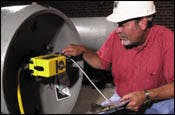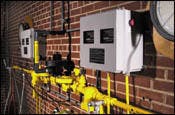Automatic Valve Operator Prevents HAZMAT Situation
Huntsville Utilities provides the water, gas and electric services for the city of Huntsville and surrounding environs. The district has three water plants and one small packaged water plant that feed to the water distribution system. The system normally supplies an average of 32 mgd. In the summer the demand has been as high as 66.5 mgd.
At one of the surface water facilities, the South Parkway Water Treatment Plant, a potentially dangerous chlorine gas leak was stopped by an automatic valve shutoff system.
The plant's chlorine facility has four ton containers mounted on ton container scales. Up to 14 tons can be on the floor at any one time. The additional 10 tons are either full and available for use but not connected or empty and awaiting return to the supplier. Of the four tons on the scales two are on-line and two are on standby. The gas valves of these four containers are always open but connected through an automatic switchover system with the two tons on-line and two on standby. The system switches to the full standby containers when the operating containers are empty. In all, depending upon the time of year and water quality, between 700 and 1,500 pounds of chlorine are fed per day.
At the chlorine storage and feed areas, chlorine gas detectors sense any level of chlorine gas in the ambient air. The gas detectors provide a continuous measurement of any ambient chlorine that might be leaking from tons and piping at the installation. The gas detectors are connected to an annunciator that alerts operating personnel when a leak is detected. An alarm contact also activates the automatic valve closure system. The system controls the automatic valve operators installed on each of the ton containers, which automatically close all the open container valves when the gas detector senses ambient chlorine.
The South Parkway facility runs with one operator per shift. On the night of Nov. 21, 2000, the operator performed his normal maintenance operations check. This included checking the piping and valves on the chlorine system for leaks with ammonia vapors. No leaks were detected. About four or five hours after the maintenance check, the gas detector alarm system sounded. Although the alarm contact is not connected to the fire department (the local HAZMAT organization), the fire department is contacted by phone for any situation that develops. By the time the operator reached the chlorine storage and use area, the automatic valve closure system had closed all four container valves on the operating and standby tons. Through the storage room door, the operator could see that there was no additional gas leaking and that the gas detector indicated that the chlorine gas had dissipated.
With the situation so rapidly stabilized, only maintenance personnel were called. Maintenance personnel found that the leak was from a packing nut on the container valve. The nut was tightened and the other connections on the system were also checked. The system was placed back in operation after a complete check including the gas detector and automatic valve closure system.
The rapid response of the automatic valve closure system minimized the exposure to chlorine for the plant operator and did not allow any local community exposure. It was estimated that only a few ounces of chlorine gas escaped.
Utility maintenance personnel had installed Halogen Valve automatic valve closure system in March 2000. One controller operates two valve operators, although systems can operate up to six. The systems undergo monthly maintenance checks and daily operational checks.
Huntsville had provided an RMP to the EPA and the automatic valve operating system provided the best method for the facility to meet the RMP needs of protection for the plant personnel and the local community. An added plus is that the model Fire Code organizations (International Model Code and Uniform Model Code) now recognize the use of automatic valve operators.
Booth 3720


